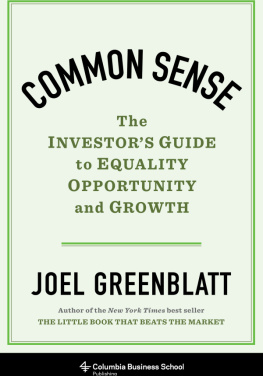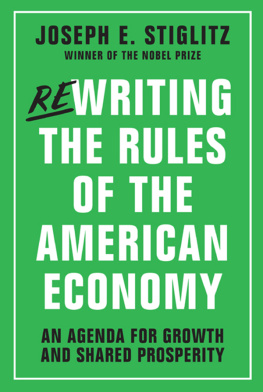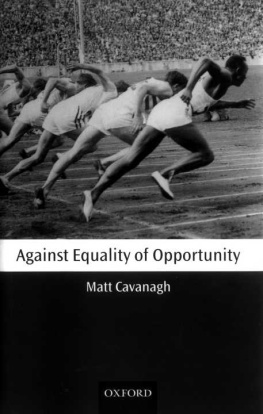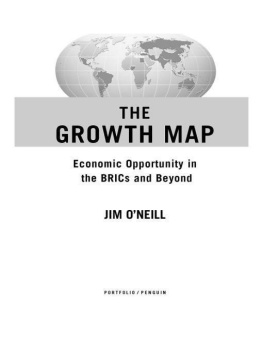Table of Contents
COMMON SENSE
Common Sense
The Investors Guide to Equality, Opportunity and Growth
Joel Greenblatt
Columbia University Press
New York
Columbia University Press
Publishers Since 1893
New York Chichester, West Sussex
cup.columbia.edu
Copyright 2020 Joel Greenblatt
All rights reserved
E-ISBN 978-0-231-55286-8
Library of Congress Cataloging-in-Publication Data
Names: Greenblatt, Joel, author.
Title: Common sense: the investors guide to equality, opportunity and growth / Joel Greenblatt.
Description: 1 Edition. | New York City: Columbia University Press, 2020. | Includes index.
Identifiers: LCCN 2020012575 (print) | LCCN 2020012576 (ebook) | ISBN 9780231198905 (hardback) | ISBN 9780231552868 (ebook)
Subjects: LCSH: Portfolio managementUnited States. | Social responsibility of businessUnited States.
Classification: LCC HG4529.5 .G7365 2020 (print) | LCC HG4529.5 (ebook) | DDC 336.20973dc23
LC record available at https://lccn.loc.gov/2020012575
LC ebook record available at https://lccn.loc.gov/2020012576
A Columbia University Press E-book.
CUP would be pleased to hear about your reading experience with this e-book at .
Cover design: Noah Arlow
CONTENTS
I am grateful to the many friends, colleagues and family who have contributed to this project. Though none are personally responsible for the opinions expressed herein, any one of those listed below could have stopped me if they had tried hard enough.
Special thanks to Andrew Tobias, Myles Thompson at Columbia University Press, Sandra Dijkstra at the Dijkstra Agency, Spencer Papay, lead research assistant at Columbia, and Eva Moskowitz at Success Academy. Special thanks also to Dean Pam Grossman at Penn GSE, Jack Spatola, John Petry, Howard Marks, David Rabinowitz, Scott Friedman, Scott Davidson, Richard Pzena, Jeffrey Schwarz, Jason Garmise, Bruce Newberg, Robert Goldstein, Randall Stutman, Bruce Rubin, Adam Barth, Bernie Seibert, Patrick Ede, Saketh Are, Windi Lowell, Clint Kugler, Lou LaRocca, Yury Kholondyrev, Ezra Merkin, Caroline Cai, Mark Fife, Stan Bratskier, Tanveer Singh, Jamie Mai, Ben Kolstad, Michelle Tessler, David Erlandson, and Katina Erlandson.
Extra special thanks for their love, support, and wisdom, to my beautiful wife, Julie Greenblatt, Matthew Greenblatt, Brooklyn Greenblatt, Rebecca Greenblatt, Abhi Ramesh, Melissa Greenblatt, Jonathan Greenblatt, Jordan Greenblatt, Richard Greenblatt, Amy Greenblatt, Erica Converso, Dr. Gary Curhan, Dr. Sharon Curhan, Linda Gordon, Michael Gordon, Rex Snow, Angela Snow, Daniel Teebor, Ellen Teebor, Bryan Binder, Dr. Susan Binder, Mickey and Allan Greenblatt, and Dr. George Teebor.
I n the 2005 movie Fever Pitch, a school teacher and rabid baseball fan, played by Jimmy Fallon, tries to explain to his new girlfriend why hes spending Easter vacation at spring training with the Boston Red Sox.
Oh, the girlfriend (played by Drew Barrymore) says, you get to train with the Red Sox? Are you allowed to do that?
Well, we dont actually we watch the games.
Arent those just practice games? she asks.
Yeah, yeah, but theres more to it than that. We scout the players. Wewe say which players they should keep which they should get rid of.
And the Red Sox ask your opinion?
Well, not yet. But if they ever do, uh
To be clear, no ones asking my opinion. The Red Sox havent called and neither has anyone else. Yet, this is a book with lots of opinions on which policies our nation should keep (and possibly expand) and which we should get rid of (or at least change)especially if we want to continue growing the pie while achieving more equality and opportunity for all of our citizens. Typically, a book like this would be written by someone elsemaybe a politician or a journalist, or perhaps an economist or academic. But Im none of the above. My perspective is a bit different.
Im a professional investment manager and businessman. In a sense, Im just a guy sitting in the cheap seats. My main skill set involves doing research and then trying to figure out which business models make sense and which ones dont. Though I have a long-term record that indicates Im pretty good at that task, Im still wrong an awful lot. Maybe you shouldnt really care what I think.
Still, I cant help having opinions, and yelling at the newspaper hasnt been very productive. Then again, the Moneyball-like analytics that now dominate decisions at virtually every major league sports team actually originated from the ideas of fans literally sitting in the standsnot from the experienced sports executives sitting in team offices. Of course, that proves nothingother than approaching issues from a diversity of perspectives and backgrounds can sometimes be helpful.
Though Ive worked in education reform for the last twenty- five years and even helped start one of the largest charter school networks in the country, Im not a professional educator. But nearly everyone agrees that true equality starts with a good education. So, it should be troubling that our education system is literally designed to be unequal from the start. Yet, as an investor, its hard to imagine a bigger payoff than successfully teaching children how to fish.
Bill Gates has called education reform more difficult than eradicating polio, malaria, or tuberculosis. While much of what I write is disturbing, I have some thoughts on how we can work around the current system to create real opportunity for students and adults of all backgroundsright now. Hopefully, youll find these ideas add a new perspective and are worth considering.
Over the last twenty years, the forces of globalization and technology have wreaked havoc on the value and pay of retail, factory, and most semi- and low-skilled workers across the country. Then again, in 1900, almost 40 percent of Americans worked on farms; now its less than 2 percent. Weve been through disruption before and not only survived, but thrived. We can do it again. But this time, change is arguably coming faster than ever. And not everyone has time for more education.
Fortunately, theres plenty we can do to help during the economys transition. It just may take a little different mindset. Thinking like a long-term investor, rather than an accountant at the Congressional Budget Office, could come in really handy as we try to help our workforce navigate these new disruptions.
Immigration is a controversial topic. But for the United States, it should be a giant bonus, not a problem. A simple change to our immigration rules can simultaneously help our current workforce, supercharge growth, and confront the challenge of a globalized economy. Though most Democrats and Republicans would support it, our existing immigration policies encourage the exact opposite behavior. The good news isit doesnt take a complicated investment thesis to understand all the benefits of this change. The math is so simple and the evidence so compelling, an elementary-school education should do the trick. While there are no free lunches in economics nor sure things in investing, this may be an exception.
Pretty much everyone hates banks and Wall Street. (I got nothing here, just thought Id mention that.) Actually, there are some simple changes to the way we capitalize and regulate banks that should help grow the economy, increase access, and create more jobs. And this time and with these changes, the risks and benefits will fall exactly where they shouldwith investors, not taxpayers.







